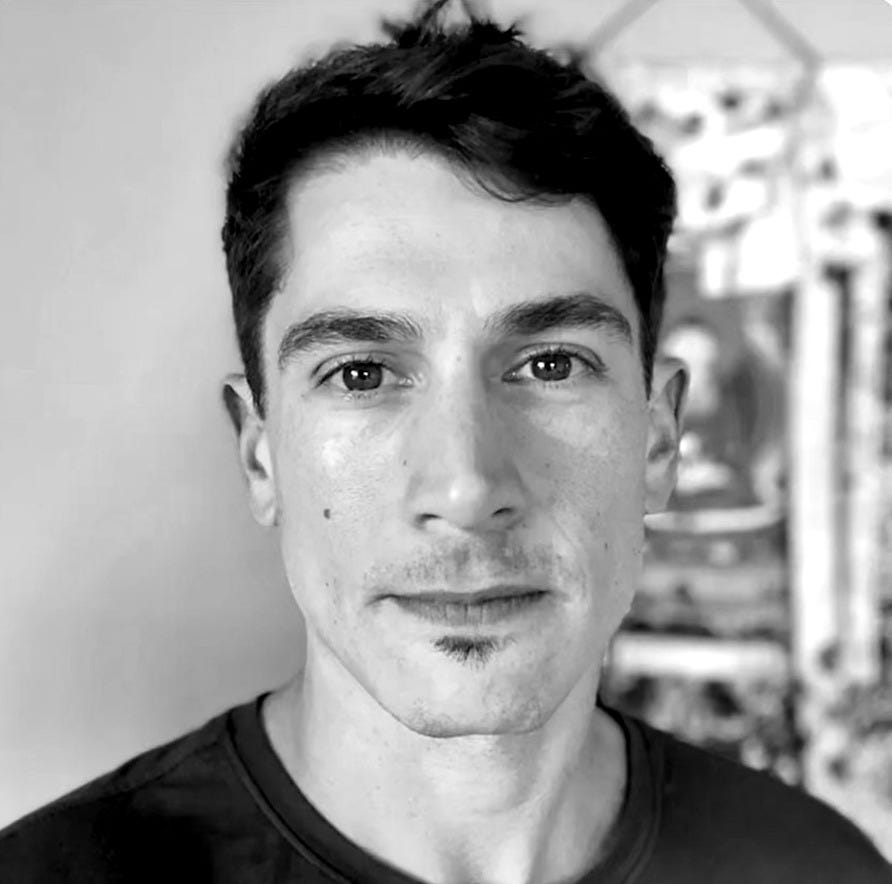Q&A with Matthew David Segall
On process philosophy and the effect of materialism on our souls.
“Truth is a decision to be moved by Love.”
The quote above may sound like something straight out of Plato, but these are actually the words of contemporary philosopher, Matthew David Segall, whose responses throughout this interview remind me of the wise poet. Which is not surprising given that Matthew’s work centers on the process philosophy of Alfred North Whitehead (you know the guy, the one who said that thing about Western philosophy being a series of footnotes to Plato. Sound familiar? 😉):
I have just ordered Crossing the Threshold. After reading this interview, I get the feeling you’ll want to do the same!
~Tina
Are there any philosophical questions that will never be resolved? Why?
MATTHEW DAVID SEGALL: There are many philosophical questions that I would suggest are destined to remain unresolved, not for lack of attention or probing, but because they point to realities that overflow the limits of conceptual containment. The question “What is the human being?” comes to mind as perpetually open due to the protean essence (or, indeed, anti-essence) of its subject. The human being is the creature without a fixed archetype, the self-shaping questioner who is always more than any answer we might offer. Our essence, if such a term still applies, lies not in what we are but in what we may become. This becoming is what might be called our freedom, which may at first appear like a blessing, though it may just as easily be felt as a curse. We are haunted by a void of indeterminacy—an abyss at once fertile and frightful.
Drawing on my process-relational philosophical orientation, I would say that the human is not a substance with properties but an unspooling thread of occasions of experience, an ongoing weaving of concrescing feelings drawn from the perished past and fraying into the open future. We are the construction site where cosmic evolution becomes conscious of itself, not as a finished product but as an infinite creative lure longing for ever-deeper communion. Our capacity for suffering—unique in its reflective, narrative, and moral dimensions—arises from our freedom: the power to imagine otherwise, to contrast pain with joy, guilt with innocence, being with not-being. Such contrasts emerge from the inner texture of our aesthetic experience, where feeling becomes meaning and meaning becomes a call to transform, and transform again.
If you had to compress your worldview into a single provocative statement, what would it be?
MATTHEW: There is no final theory, only the cosmos imagining itself through us in ceaseless becoming. There is no self-conscious ego who might understand the explanation, anyway. The knower is of the flux, not above it. We are known before we are knowers, and every knowing makes a new knower. What seems fixed is a wave crest of creativity, where forms ingress into fact and potential perpetually presences, and recedes. To know this is to awaken not to an abstract truth, but to the Goodness implicit in the world’s self-surpassing Beauty. This is not passive perceiving, but an act of imagination—an intentional entrance into the sacred swirling of the World-Soul. Truth is not the conformity of thought to object but the fidelity of our heart’s imagination to Her, to Momma Mundi. Truth is a decision to be moved by Love. We become Good by giving ourselves wholly to participation in the world’s becoming. In the death of our ego-image is the beginningless birth of our Self, made Imago Dei. Science, religion, and philosophy thus cease to be different ways of mapping and mastering an abstract order and become a celebratory expression of the triune depths of relational experience, a means of integrating cosmos (the world’s Truth), theos (divine Goodness), and anthropos (our love of Beauty) in the logos of a living Earth.
What's the most dangerous idea in philosophy today?
MATTHEW: I agree with
that materialism, particularly the more reductive and eliminative version, is very bad for our mental health. When perceived scientific authorities tell people that their entire reality is confined to the goings-on inside their skull, they are contributing to the death of the human spirit. Without a celestial sense or intimate relation to the whole we become as nothing, nihil. Souls are made out of the ideas we take to be true. Materialism unmakes souls. No glut of pleasure or scramble for status can fill the hole left by being severed from the whole. Materialism is dangerous because it confuses us into believing that personhood and freedom are fables. In fact it is only because of the value realized by free persons that knowledge is possible.What do YOU think?
Are you intrigued by the idea that “we are the construction site where cosmic evolution becomes conscious of itself”?
Do you think : “Truth is not the conformity of thought to object but the fidelity of our heart’s imagination to Her, to Momma Mundi”?
Are souls “made out of the ideas we take to be true”?
“When perceived scientific authorities tell people that their entire reality is confined to the goings-on inside their skull, they are contributing to the death of the human spirit.” Do you agree?
MATTHEW DAVID SEGALL, PhD, is a transdisciplinary researcher, integral philosopher, and teacher applying process-relational thought across the natural and social sciences. He is an associate professor in the Philosophy, Cosmology, and Consciousness Department at California Institute of Integral Studies. He is author of several books, including Crossing the Threshold (2023) and Physics of the World-Soul (2021).
You can customize which bits of this newsletter you receive by visiting your account.
Thanks for supporting my literary endeavors and off-beat philosophical speculations. Cheers!
—Tina











I've been a fan of David's work for a little while now. Haven't read his books yet, but definitely intend to.
"There is no final theory, only the cosmos imagining itself through us in ceaseless becoming. There is no self-conscious ego who might understand the explanation, anyway."
Yes! There's a fantastic passage in Process & Reality where Whitehead makes this point, saying how there can be no complete set of all actual entities, because to encompass all actual entities would require being a further actual entity looking down upon them all, which contradicts the completeness of the set (I'm guessing David probably had this in mind). Like how there can be no "set of all sets" in mathematics. There's this inherent incompleteness to reality, and that is what gives space for freedom.
I agree about materialism, or at least its reductive forms, being incredibly destructive, both on an individual level and also socially and ecologically. When you look at the world as lifeless matter, there is nothing to do but to shape it according to your own Will. Matter is means, not end, and so materialism leads to viewing everything as a means to my ends.
Great to see you two doing a collaboration. I have been following both of you for years.